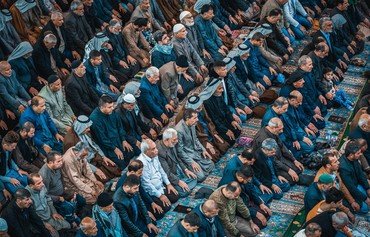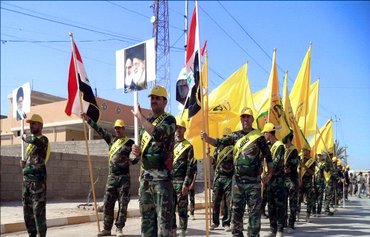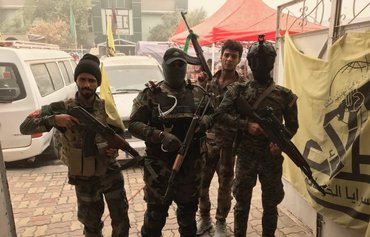By stirring up sectarian strife in Iraq, Iran-backed Iraqi militias are attempting to further the agenda of the Iranian regime, Iraqi politicians and analysts said.
Through its proxies in Iraq, which are controlled by the Islamic Revolutionary Guard Corps (IRGC), Iran has been attempting to shift the demographic composition of areas liberated from the "Islamic State of Iraq and Syria" (ISIS).
"The IRGC its trying to expand and control the country through its tyrannical proxies in the form of sectarian militias that are run by [IRGC Quds Force commander] Qassem Soleimani," former Iraqi MP Mithal al-Alousi told Diyaruna.
The IRGC has been strengthening militias that embrace the doctrine of Wilayat al-Faqih (Guardianship of the Jurist) with the goal of securing a strong foothold in all Iraqi provinces in order to serve Iran's agenda, he said.
These militias seek to dominate the Iraqi street and influence decision-makers, and are implementing Iran's plans by inflaming sectarian tensions among Iraqis in service of Iranian interests, he added.
"Militias have assassinated free-thinking activists and intellectuals in several Iraqi provinces such as Basra, Karbala, Najaf and in the heart of Baghdad as part of this plan," al-Alousi said.
"They want to silence [dissenting] voices and fight civil co-existence by spreading [sectarianism] and a culture of hostility towards others," he said.
"Fomenting sectarian strife is one of the most dangerous weapons that Tehran is using to reach its goals," he said, as this paves the way for greater Iranian political and economic influence.
Al-Alousi warned against "the dangers of falling prey to any sort of escalation or obfuscation attempts using deceptive slogans and incitement". He also called on the international community to curb Iran’s hostile acts and those of its proxies.
'Form of terrorism'
The increasing number of sectarian activities in Iraq, particularly in cities liberated from ISIS, is itself "a form of terrorism", Iraqi journalist Ziyad al-Sinjari told Diyaruna.
On the orders of the IRGC, he said, Iran-backed Iraqi militias have "seized state property and land as well as mosques that had been the property of the Sunni Waqf (Endowment) for years in Mosul".
These include the Prophet Seth Mosque, Prophet Younis Mosque as well as the jewelers market, he said.
The local population has responded to these actions with "rage and resentment", he said, interpreting this "as a flagrant attempt to ignite sectarianism".
"The militias also are trying to alter the demographic makeup of the country by deporting people from their homes and preventing them from returning to their original areas of residence," he said.
This was the case in Salaheddine's Jarf al-Sakhr district, where residents were prevented from returning by Iran-backed militias following the ouster of ISIS.
Similar attempts have been reported in towns that lie on the outskirts of Baghdad and Ninawa provinces, al-Sinjari said.
Other actions taken by the militias include random detentions and harassment, he said, which intend to drive the wedge of sectarianism and "feed societal divisions".
In a further sign of Iranian influence, in some areas of Iraq, including Diyala province, overtly sectarian flyers and posters are openly displayed on city streets and in public squares, along with pictures of Iranian leaders.
Undermining Iraqi identity
Undermining Iraqi identity is "one of the most dangerous things that Iran and its proxy militias are aiming to achieve", said Ghazi Faisal Hussein, an adviser at the Iraqi Centre for Strategic Studies.
"The regime in Iran is reliant upon a strategic goal of exporting the Wilayat al-Faqih doctrine to the region," he told Diyaruna, which is why the regime attempts to influence the cultural and religious identities of other nations.
Iran has been promoting Wilayat al-Faqih among Iraqi Shias to propagate the idea that they should be "fully loyal to Iran", he said, adding that Iran also seeks to dominate the holy city of Najaf.
"The Iranians are working towards spreading their ideology among the inhabitants of liberated areas," Hussein said, noting that the regime uses a "carrot and stick approach" to prod residents into accepting Wilayat al-Faqih.

![Members of an Iran-backed Iraqi militia take part in an al-Quds Day parade sponsored by Iran in Iraq's Wasit province in June 2017. [Photo circulated on social media]](/cnmi_di/images/2019/07/04/18684-Iraq-Iran-militia-600_384.jpg)







Mr. Mithal al-Alousi said relations between the Islamic Republic of Iran and the Iraqi people are better than relations with Israel to which that person belongs. Enough with your quackery, lies and deviation! Sectarianism is from you and in you. Shias have always been true to their beliefs, and have always been peaceful to all other sects and religions. The proof is that they defended Sunnis with all that they have, and Iranians have given martyrs for the sake of the Iraq of sanctities.
Reply1 Comment(s)